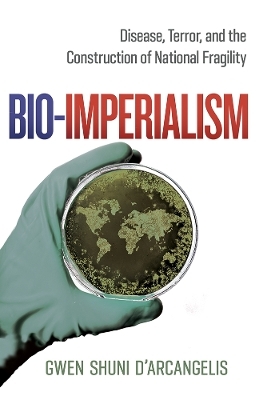
Bio-Imperialism
Disease, Terror, and the Construction of National Fragility
Seiten
2020
Rutgers University Press (Verlag)
978-1-9788-1478-3 (ISBN)
Rutgers University Press (Verlag)
978-1-9788-1478-3 (ISBN)
Focuses on an understudied dimension of the war on terror - the fight against bioterrorism. This component of the war included the enlistment of bioscientists and health workers to augment US biodefense and disease control infrastructure, advancing US control over biological resources on a global scale.
Bio-Imperialism focuses on an understudied dimension of the war on terror: the fight against bioterrorism. This component of the war enlisted the biosciences and public health fields to build up the U.S. biodefense industry and U.S. global disease control. The book argues that U.S. imperial ambitions drove these shifts in focus, aided by gendered and racialized discourses on terrorism, disease, and science. These narratives helped rationalize American research expansion into dangerous germs and bioweapons in the name of biodefense and bolstered the U.S. rationale for increased interference in the disease control decisions of Global South nations. Bio-Imperialism is a sobering look at how the war on terror impacted the world in ways that we are only just starting to grapple with.
Bio-Imperialism focuses on an understudied dimension of the war on terror: the fight against bioterrorism. This component of the war enlisted the biosciences and public health fields to build up the U.S. biodefense industry and U.S. global disease control. The book argues that U.S. imperial ambitions drove these shifts in focus, aided by gendered and racialized discourses on terrorism, disease, and science. These narratives helped rationalize American research expansion into dangerous germs and bioweapons in the name of biodefense and bolstered the U.S. rationale for increased interference in the disease control decisions of Global South nations. Bio-Imperialism is a sobering look at how the war on terror impacted the world in ways that we are only just starting to grapple with.
Gwen Shuni D’Arcangelis is an associate professor of gender studies at Skidmore College in Saratoga Springs, New York.
Contents
List of Illustrations
Introduction: Bio-imperialism and the Entanglement of Bioscience, Public Health, and National Security
1. The Making of the Technoscientific Other: Tales of Terrorism, Development, and Third World Morality
2. From Practicing Safe Science to Keeping Science Out of “Dangerous Hands”: The Resurgence of U.S. “Biodefense”
3. Co-opting Caregiving: Softening Militarism, Feminizing the Nation
4. Preparedness Migrates: Pandemics, Germ Extraction, and “Global Health Security”
Epilogue: Repurposing Science and Public Health
Acknowledgments
Notes
Bibliography
Index
| Erscheinungsdatum | 15.01.2021 |
|---|---|
| Zusatzinfo | 7 b-w images |
| Verlagsort | New Brunswick NJ |
| Sprache | englisch |
| Maße | 140 x 216 mm |
| Gewicht | 3 g |
| Themenwelt | Geisteswissenschaften ► Geschichte ► Allgemeine Geschichte |
| Geschichte ► Teilgebiete der Geschichte ► Militärgeschichte | |
| Sozialwissenschaften ► Politik / Verwaltung | |
| Sozialwissenschaften ► Soziologie ► Gender Studies | |
| ISBN-10 | 1-9788-1478-X / 197881478X |
| ISBN-13 | 978-1-9788-1478-3 / 9781978814783 |
| Zustand | Neuware |
| Informationen gemäß Produktsicherheitsverordnung (GPSR) | |
| Haben Sie eine Frage zum Produkt? |
Mehr entdecken
aus dem Bereich
aus dem Bereich
neueste Manipulationstechniken als Waffengattung der NATO
Buch | Softcover (2023)
Westend (Verlag)
24,00 €


